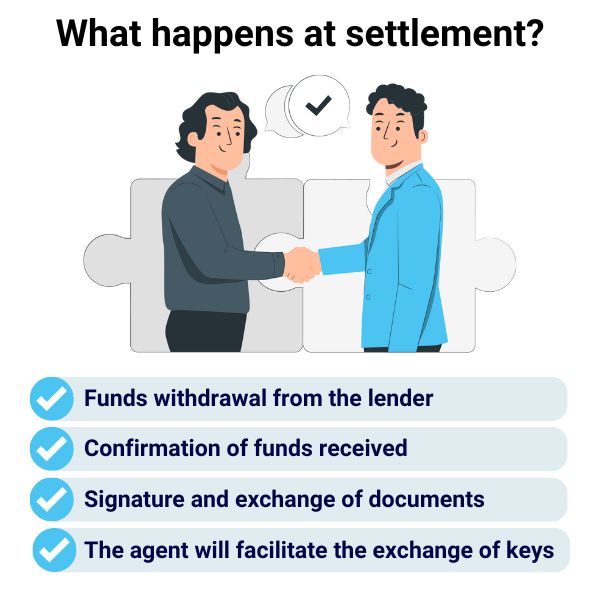What happens at settlement?
Whether you’re buying or selling a property, it’s necessary to stay informed about what will happen on the settlement day itself, as well as to ensure you have prepared everything you need for a successful settlement.
Your conveyancer will provide a thorough briefing of the line of events on settlement day, but it doesn’t hurt to do your own research to understand the process from your perspective, whether as a buyer or a seller.
Is settlement day the day you move in?
Settlement day is the day on which the property transaction will be completed, making buyers the new owners of the property. The decision to move into the property, however, will be up to buyers — while most buyers will choose to move in immediately, some may choose to do so at a later date for other reasons.
What happens on the day of settlement?
On the day, your conveyancer or solicitor will meet up with the other party’s representative to facilitate the transfer of funds and property ownership. As a buyer or seller, there’s not much for you to do during this meeting, as all of the specific details of the transaction will be handled by your conveyancer, such as the checking and exchange of the final documents of the sale.
Funds withdrawal from the lender
Once all of the necessary documents have been checked, the buyer’s settlement agent will work with the buyer and their lender to facilitate the transfer of funds to the seller’s bank account. At this point in time, buyers should expect to see the right amount of funds leaving their bank account.
Confirmation of funds received
When the transfer of funds for the purchase price of the property has been made, the seller’s agent will communicate with the seller to ask for a confirmation of the receipt of funds. The seller will have to perform a check of their provided bank account to ensure that the correct amount of funds has been transferred.
Signature and exchange of documents
Most of the official transaction documents will have been prepared by both parties in advance of the settlement day, save for the final signatures and checks, which will be completed at this stage. Both buyers and sellers will have to provide their final sign-off on the required documents before they are sent off to the titles office for registration and processing.
The agent will facilitate the exchange of keys
The seller’s settlement agent will then pass the keys to the property over to the buyer’s representative. This signifies the end of the settlement process and the completion of the property transaction. These keys will then be passed on later to the buyers (the new owners of the property!).
Do you have to be physically present at the settlement?
Not at all. Almost all property settlements are conducted electronically, usually on the PEXA platform. Your conveyancer or solicitor will advise you on how and when to access the online conveyancing platform during the settlement process.
What to do while waiting for settlement?
Preparation should be the focus for both buyers and sellers during the weeks leading up to settlement. Your conveyancer will provide specific guidance for what actions need to be taken.
Settlement checklist for buyers
- Getting funds in order
Ensure that you have sufficient funds for the transfer in the correct bank account before and on the day of settlement to avoid placing the transaction at risk of delays (or even termination).
- Final inspection
The final inspection is your last chance as a buyer to check on the condition of the property.
There’s a lot to check for during a final inspection —every part of the property should still in the same acceptable condition that you first saw it in, especially areas like the doors and windows, electrical outlets, lighting, plumbing, water heaters, air conditioners and heaters.
If the seller agrees to make any repairs, leave any inclusions, or address any other issues with the property as stated in the contract of sale, check that these have been sufficiently dealt with. Raise any potential issues such as new damages to your conveyancer or solicitor.
- Arrange for utilities
Planning to move in as soon as settlement is complete? You may wish to start making arrangements to have the utilities of the property transferred to your name so that it will be ready for use by the completion of the settlement.
- Check Certificate of Titles
Ensure that your name has been spelt correctly in legal form on the certificate of title before providing your signed confirmation for the settlement. Any errors in the naming or other personal details could end up being problematic later on.
Settlement checklist for sellers
- Ensuring the condition of the property
Make sure to carry out the necessary checks for the property’s condition, especially concerning any renovation or repair work set out in the contract of sale. This should be done in the days and weeks leading up to the settlement date.
- Moving out
Be sure to clear out all of your personal belongings, save for inclusions that the buyer has agreed to leave in place. Any current occupants of the property should also be vacated by the settlement date to avoid delays.
- Handover keys
Gather the various keys to the property (main door, rooms, garage) and label them accordingly to help keep track of what needs to be passed over to the client during the settlement process.
- Check for funds
Upon receiving a notification from your conveyancer or solicitor, make sure that you have received the right amount of funds for the agreed-upon price of the property. Any discrepancy should be communicated to your settlement agent who will be able to seek clarification on your behalf.
Can you get keys before settlement?
Yes, but it will come with several caveats. Sellers will usually be reluctant to do so as it poses greater risks for them, specifically related to the condition of the house, but getting early possession is possible through negotiation. Buyers who want to get access to the property ahead of the settlement should ask their conveyancer to relay the request to the selling party.
How long will the settlement take?
Property settlement periods are usually 30 to 90 days and involve the legal preparations of both parties. The settlement process on the day, however, is much shorter — with the entire process taking place electronically, it can be completed as quickly as within an hour. After that, both buyers and sellers are free to enjoy the fruits of the transactions at their leisure.






